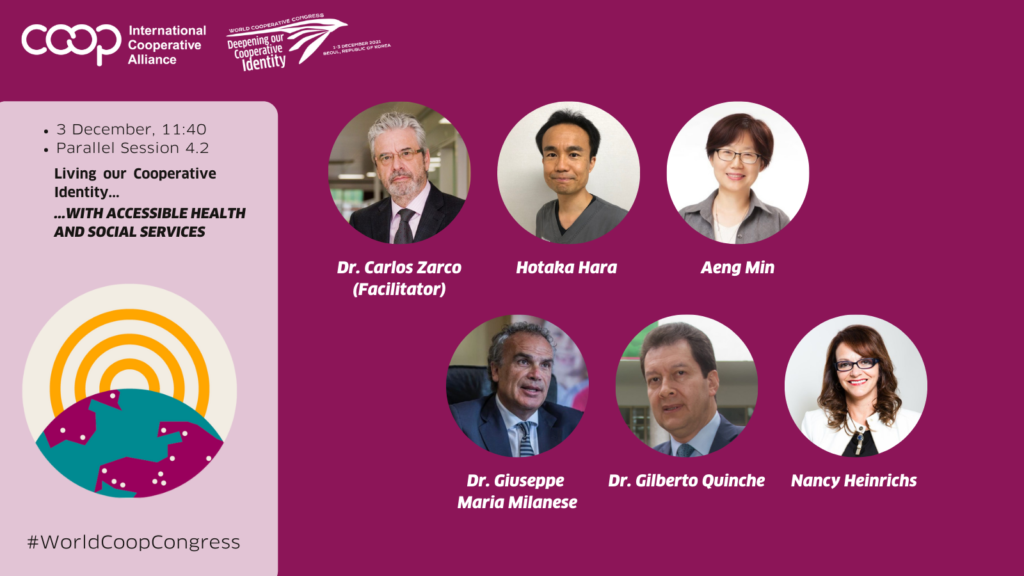
Introducing a session on living the cooperative identity through integrated health and social care, Dr Carlos Zarco, President of the IHCO and Director of Fundacion Espriu, Spain, said the pandemic had highlighted people’s worries over healthcare. “Patients want to get the best health care at the lowest cost. And cooperatives allow patients to work together to work with health providers, and even become the owners of the health resources.”
Case studies in how this works came from panelists including Nancy Heinrichs, Executive Director, at NorWest Coop Community Health, in Manitoba, Canada, who said her country’s 53 health care cooperatives work within the country’s free healthcare system.
NorWest “went into overdrive” during the pandemic and won an award in its city for the most innovative response to vaccine hesitancy vaccine uptake, she said.
“We received epistemological data indicating that our indigenous immigrant populations in our community were experiencing high COVID-19 infection rates and low vaccination rates,” she said. “The data helped us inform all aspects of our strategy.”
Working with a team of doctors, nurses, counsellors, community development and public health workers, NorWest ran a multi-pronged approach to tackle barriers around language, transport and trust; innovative community strategies included Tik-Tok videos created by a priest to highlight the benefits of vaccinations to his community.
“We worked together in a way we had never worked before. This will change our health coop forever … We will continue these teams going now.”
Future challenges include an ageing population, and climate change, with studies showing that most deaths from the heatwaves that hit Oregon, USA, occurred in low-income households.
Solutions include micro teams of health and social services to work with high-needs communities and a digital platform where cooperatives around the world can share ideas, collaborate and trade services.
She urged delegates to keep the lessons learned from the Congress because “when we lose sight of our cooperative identity, we’re putting our cooperative existence in peril”. She highlighted the recent demutualisation of Canada’s Economical Mutual Insurance as a warning of what can happen when a large cooperative loses its way.
Hotaka Hara, former Board Member of Health and Welfare Cooperatives Federation, Japan, gave an overview of his national sector, with 100 autonomous member cooperatives, with their own boards and general assemblies to make decisions. They have 75 hospitals, 333 primary health care centres and 179 nurse home visit stations, employing 2,138 doctors, 241 dentists, 501 pharmacists, 12,740 nursing staff, 3,3867 therapists, and 7,534 nursing care staff.
Health schemes include community ‘hon-group’ meetings, where cooperative members gather to promote good health, looking at issues such as blood pressure and body fat. Sometimes health professionals join in to offer advice but members are given training to carry out the assessments. There are similar meetings on child health.
The health system was overwhelmed during the pandemic and in response measures were taken to prevent the spread. Measures taken by cooperatives included the manufacture and distribution of masks, promotion of social distancing and outreach by phone and online to prevent loneliness during lockdown. And mutual help groups were formed to help people book and attend vaccinations.
Future priorities include the promotion of co-production, creating neighbourhood networks and making management more sustainable.
Dr Giuseppe Milanese, Chairman of Italy’s Conf-Cooperative, said the pandemic had laid bare weaknesses in the world healthcare system, killing more than 5million people and 115,000 healthcare professionals around the world.
The WHO has published a new report setting out measures for more resilience, with primary health care the cornerstone. Many countries lacked adequate primary health resources as they went into the pandemic, said Dr Milanese – including Italy.
The real challenge in Italy will be to catch up the 10 year gap in primary health care for an ageing population with chronic disease and health fragilities, he said. Critical issues include the lack of community-based health services.
Innovations by the cooperative sector during the pandemic include COVID-19 hotels to give care to patients outside hospitals, digital tools to monitor patients at home, and safe bubbles for older patients.
Out of the pandemic comes an opportunity to transform the health system, he said. To fail in this, he warned, risks “a situation that would probably lead to the collapse of our public and universal system, opening the way to financial capital and the privatisation of the system”.
Dr Gilberto Quinche, General Manager of Coomeva Health Cooperative in Colombia, said the country has a national healthcare system which includes more than 3,000 primary care and insurance cooperatives, sharing more than 6 million members. The system has improved life expectancy and pregnancy and child mortality rates.
The third wave of Covid-19 brought 30,000 cases, and 700 deaths, a day in Colombia. In response, the country increased the number of ICU beds from 5,000 beds to 13,000. Half the population is now double vaccinated, with boosters under way among the vulnerable, and cases have fallen to 2,000 a day, with 60% occupation of the ICUs.
The cooperative sector’s response was based on “solidarity and generosity”, encouraging home working and vaccination among its own workers, and offering relief packages to members, partners and communities.
Aeng Min, Executive Director, Korea Health Welfare Social Cooperative Federation, said issues her organisation faces include an ageing population – which will increase the cost of care – and a low birth rate which means people face old age without family care.
The cooperative sector has changed its model from consumer to social cooperatives, she said, after it suffered problems of “legal people trying to use cooperative hospitals as their cash cow”.
The next development will be to grow integrated care and health care service cooperatives, a project initiated in 2019 to deal with Korea’s demographic problems.
She called on Korea’s government to enact cooperative law to enable integrated community care from social and economic cooperatives.
And she asked the ICA to provide more advanced guidelines on public private cooperation.
